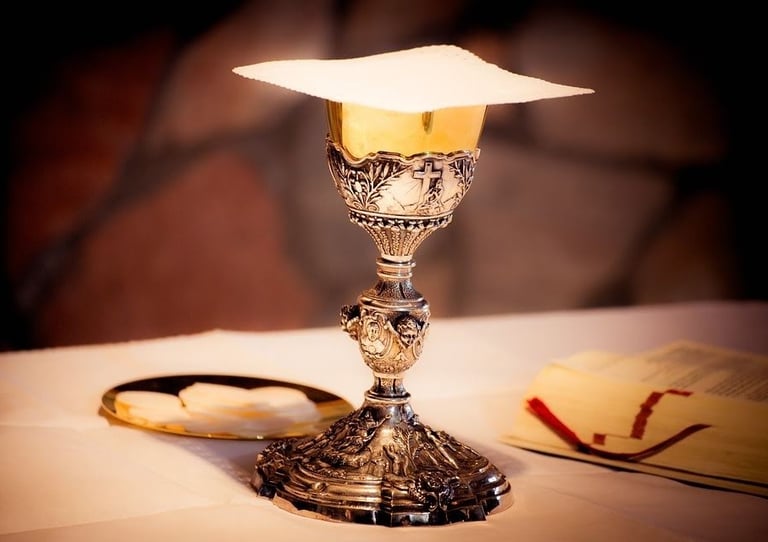Power Mighty in the Blood - Part 3: A Superior Sacrifice
Christ obtained a more excellent ministry; and He is the mediator of a much better covenant, which was established on better promises – Hebrews 8:6


Hebrews 8 tells us that the sacrifices offered under the Mosaic Law were a shadow of things to come. It is therefore expected that the sacrifices made on the day of atonement will somewhat compare to that which Christ made on Calvary, although with Christ’s being more superior. In this article, I’ll attempt to highlight key activities that occurred on the day of atonement, how the sacrifice of Jesus compared to them, and how Christ’s is more superior.
The High Priest
The Old Covenant:
The high priest was from the line of Aaron and could only come from the line of Aaron. Hebrews 7:11
On the day of atonement, he also had to make sacrifices for himself because he shared the same sin weaknesses with the people. Hebrews 5:2-3, 7:28
He alone had access to the holy of holies and entered in only once a year. Leviticus 16:2; Hebrews 9:7.
The Superior Covenant:
Jesus came as a High Priest after the order of Melchizedek and not after the order of Aaron. He was from the line of Judah, whose tribe had no business with priesthood.
Now, it is important to note that Jesus could not have come after the order or lineage of Aaron (or Levi, for that matter). This is because the Levitical Priesthood already had a law – an imperfect law, the law of sin and death. For Christ to present a new law, the order of the priesthood had to change.
Hebrews 7:11-12 - 11 If therefore perfection were by the Levitical priesthood, (for under it the people received the law,) what further need was there that another priest should rise after the order of Melchisedec, and not be called after the order of Aaron? 12 For the priesthood being changed, there is made of necessity a change also of the law.
A new law required a new priesthood.
The Levitical priesthood was also imperfect and could not deliver eternal salvation to the people. It was made out of a carnal and fleshly commandment. Priesthood of Christ is made after the power of an endless life. – Hebrews 7:16
The Sacrificial Animals
The Old Covenant: On the day of atonement, the high priest had to come with a young bull for the sin offering of himself and his family. He also had to sacrifice one male kid for sin offering of the people. Leviticus 16:3-5.
The Superior Covenant: In the case of Jesus, Jesus Himself became the sin offering. His own blood was spilled for the remission of sin of the people.
Hebrews 9:11-14; Hebrews 7:27; 1 Peter 1:18-19
The Old Covenant:
The animals that were sacrificed as sin offering were burned outside the camp. The high priest laid hands on a scapegoat to transfer the sins of the people on it.
The scapegoat was led by “the hand of a fit man” outside the camp and the carcass of the sin offerings were burned outside the camp by another person.
Both he that led the scapegoat out and he that burned the carcass of the sin offering had to cleanse themselves when they returned.
The Superior Covenant: Jesus was sin offering whose blood was spilled. He was the “scapegoat” on whom the sin of the whole earth was laid. Jesus by Himself led himself outside the camp, where His flesh was torn, pierced, and buried.
Hebrews 13:11-12 - 11 For the bodies of those beasts, whose blood is brought into the sanctuary by the high priest for sin, are burned without the camp. 12 Wherefore Jesus also, that he might sanctify the people with his own blood, suffered without the gate.
The Tabernacle (and Items therein), the Altar, the Mercy Seat
The Old Covenant: On the day of atonement, the High Priest sprinkled the blood ¬¬of the animals He slaughtered in the tabernacle and on the items therein to purify them.
Leviticus 16:33 – And he shall make an atonement for the holy sanctuary, and he shall make an atonement for the tabernacle of the congregation, and for the altar, and he shall make an atonement for the priests, and for all the people of the congregation.
Hebrews 9:21-22 – Moreover he sprinkled with blood both the tabernacle, and all the vessels of the ministry. And almost all things are by the law purged with blood; and without shedding of blood is no remission.
The Superior Covenant: In similar manner, there was purification of things in heaven. However, with better sacrifices than that under the Mosaic law. Jesus Himself entered into Heaven and appeared before God, as High Priest AND sacrifice, on our behalf. It wasn’t just about His blood cleansing or purifying the heavenly things; it was about Him entering that place, not sprinkling blood on the mercy seat, but sitting thereon. His shed blood signifies the life He gave for the sins of mankind.
Hebrews 9:23-24 – 23 It was therefore necessary that the patterns of things in the heavens should be purified with these; but the heavenly things themselves with better sacrifices than these. 24 For Christ is not entered into the holy places made with hands, which are the figures of the true; but into heaven itself, now to appear in the presence of God for us.
The Frequency of the Sacrifices
The Old Covenant: The Day of atonement occurred every year. This means that God remembered the sins of the people every year and they had to come before Him and make sacrifices to atone for their sins every year that they may appear clean before God.
Leviticus 16:29 - And this shall be a statute for ever unto you: that in the seventh month, on the tenth day of the month, ye shall afflict your souls, and do no work at all, whether it be one of your own country, or a stranger that sojourneth among you
The Superior Covenant: Christ’s sacrifice happened once and for all. His sacrifice finished the work of man’s redemption. Through the sacrifice of Jesus, no one ever has to make yearly sacrifices to atone for sin. It was a complete, finished work.
1 Peter 3:18 - For Christ also hath once suffered for sins, the just for the unjust, that he might bring us to God, being put to death in the flesh, but quickened by the Spirit.
Hebrews 10:10 - By the which will we are sanctified through the offering of the body of Jesus Christ once for all.
Romans 6:10 - For in that he died, he died unto sin once: but in that he liveth, he liveth unto God.
Hebrews 9:26 - For then must he often have suffered since the foundation of the world: but now once in the end of the world hath he appeared to put away sin by the sacrifice of himself.
THE INADEQUACY OF THE LEVITICAL PRIESTHOOD
The Levitical priesthood was definitely not perfect. If it were, Jesus would not have needed to come.
Hebrews 7:11 - If therefore perfection were by the Levitical priesthood, (for under it the people received the law,) what further need was there that another priest should rise after the order of Melchisedec, and not be called after the order of Aaron?
The Levitical priesthood was made out of carnal commandment. The priesthood of Christ is made after the power of an endless life.
Hebrews 7:16 - Who is made, not after the law of a carnal commandment, but after the power of an endless life.
The Levitical priesthood has no life in it. The Priesthood of Christ has abundant life.
Romans 8:2 - For the law of the Spirit of life in Christ Jesus hath made me free from the law of sin and death.
The Mosaic law made nothing perfect. The law of Christ brings perfection and draws us near to God.
Hebrews 7:19 - For the law made nothing perfect, but the bringing in of a better hope did; by the which we draw nigh unto God.
The Levitical priesthood was entered in without any oath. But Jesus entered in with an oath. This makes Jesus the guarantor of a much better covenant.
Hebrews 7:20-22 – 20 And inasmuch as not without an oath he was made priest: (For those priests were made without an oath; but this with an oath by him that said unto him, The Lord sware and will not repent, Thou art a priest for ever after the order of Melchisedec:) By so much was Jesus made a surety of a better testament.
Under the Levitical system, a person’s priesthood ended with his demise. But Jesus lives forever; so, His priesthood and His covenant never ends. Therefore, He is able to save eternally.
Hebrews 7:23-25 - And they truly were many priests, because they were not suffered to continue by reason of death: But this man, because he continueth ever, hath an unchangeable priesthood. Wherefore he is able also to save them to the uttermost that come unto God by him, seeing he ever liveth to make intercession for them.
Unlike the Levitical high priest who also sinned and had to make a sin offering for himself as well, Jesus is a High Priest who is holy, harmless, undefiled, separate from sinners, higher than heavens.
Hebrews 5:2-3 - Who can have compassion on the ignorant, and on them that are out of the way; for that he himself also is compassed with infirmity. And by reason hereof he ought, as for the people, so also for himself, to offer for sins.
Hebrews 7:26-28 - For such an high priest became us, who is holy, harmless, undefiled, separate from sinners, and made higher than the heavens; Who needeth not daily, as those high priests, to offer up sacrifice, first for his own sins, and then for the people's: for this he did once, when he offered up himself. 28 For the law maketh men high priests which have infirmity; but the word of the oath, which was since the law, maketh the Son, who is consecrated for evermore.
Under the Levitical priesthood, there was a constant reminder of sin. But in this new and better covenant, sin is forgiven and there is no remembrance of it (Hebrews 10:3-4), thereby making access to God unlimited (Hebrews 10:19).
In summary, we have a High Priest who is set on the right hand of the Majesty in the heavens. He is a minister of the sanctuary and of the true tabernacle, built by God. Hebrews 8:1-2. The Levitical priesthood was a type/shadow of what Moses had seen in the heavenlies. It was not the real thing, only an attempt to replicate the pattern of things in heaven until Christ was revealed – Hebrews 8:3-5. Christ obtained a more excellent ministry; and He is the mediator of a much better covenant, which was established on better promises – Hebrews 8:6; and this covenant was necessary, because as was earlier mentioned, the old covenant was flawed (Hebrews 8:7). In the new covenant lies eternal redemption for all people.



-YX498vOEvBTDMbOK.png)
-YX498vOEvBTDMbOK.png)
-YannNl4R0EIaoeOk.png)
-YannNl4R0EIaoeOk.png)
-AR0zZR1ZERC46LxB.png)
-AR0zZR1ZERC46LxB.png)

